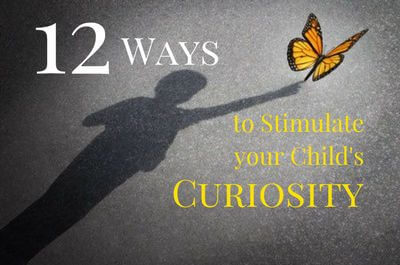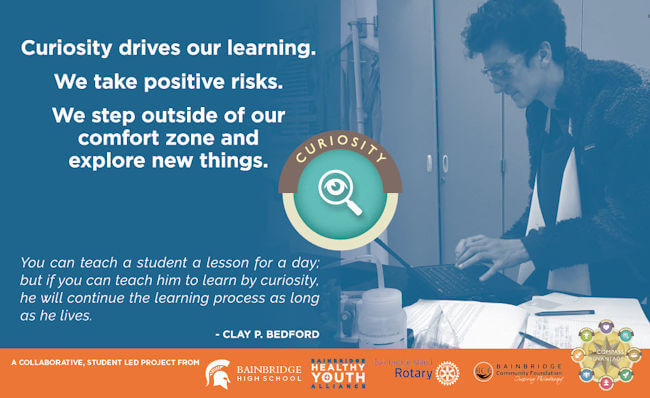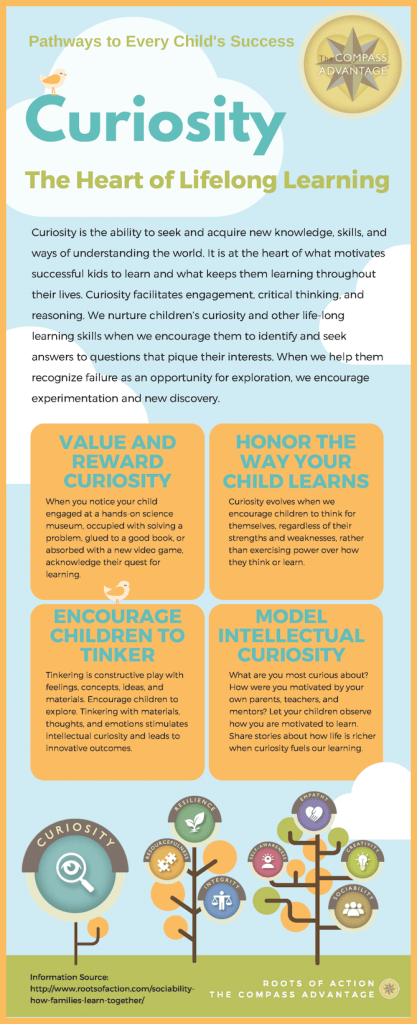
Intellectual curiosity and learning go hand in hand. But let’s be honest…
Curiosity isn’t what most of us first think about when it comes to our children’s education. We want our kids to do well in school so we usually focus on external measurements of learning and academic success — grades.
This external focus is understandable.
Good grades are outward acknowledgements of a job well done. In the long term, grades play a key factor in college acceptances and, in some cases, bring offers from very prestigious universities.
Grades and test scores alone, however, are not enough to foster lifelong learning. Nor are they enough to develop emotional wellbeing. Not even close.
Have we neglected something critical to kids’ success?
According to research, intellectual curiosity is the hidden force that drives learning, critical thinking, and reasoning. Curiosity helps children seek and acquire new knowledge, skills, and ways of understanding the world. It is at the heart of what motivates young people to learn and what keeps them learning throughout their lives.
Most of us know that many children can achieve good grades without being curious — by understanding the system of test-taking and dutifully doing their homework.
Curious children, on the other hand, spend a great deal of time reading and acquiring knowledge. Why? Because they sense a gap between what they know and what they want to know — not because they are motivated by grades.
When kids are in curiosity’s grip, they often forget the immediate goals at hand because they are preoccupied with learning. This was the case with young people I interviewed for my book, Tomorrows Change Makers: Reclaiming the Power of Citizenship for a New Generation. Many of them were so focused on public service that they missed school deadlines or didn’t have time to study for exams.
The young people I interviewed defined their success differently than many of today’s youth. They wanted to learn, not just achieve good grades.
Wow. What a concept.
Why Intellectual Curiosity Is Important to Kids’ Success
If you suspect that curious kids fare better in careers and life, you’re right, and for a variety of reasons. Research suggests that intellectual curiosity has as big of an effect on performance as hard work. When put together, curiosity and hard work account for success just as much as intelligence.
Another study found that people who were curious about a topic retained what they learned for longer periods of time. And even more impressive, research has linked curiosity to a wide range of important behaviors, including tolerance of anxiety and uncertainty, positive emotions, humor, playfulness, out-of-box thinking, and a noncritical attitude — all attributes associated with healthy social outcomes for children and adults.
Psychologists view intellectual curiosity as a life force, vital to happiness, intellectual growth, and wellbeing. It is interconnected with each of the other abilities of The Compass Advantage — sociability, resilience, self-awareness, integrity, resourcefulness, creativity, and empathy.
Like most human abilities, curiosity also has a dark side. After all, it did kill the cat! And without proper nurturing by parents and teachers, unregulated curiosity can lead children down rabbit holes that waste time, obstruct goals, or damage health.
The greatest advantage of curiosity lies in its power to motivate learning in areas of life and work that are meaningful to the learner. It points students toward the knowledge, skills, relationships, and experiences that they need to live full and productive lives.
Students from Bainbridge High School in Washington State chose the photo, words, and quote for the above CURIOSITY banner — one of seven that hang in the hallways of their school to remind all students of the core abilities that matter most to their development and wellbeing.
Intellectual curiosity is easily recognizable. We see it when we observe children and teens exploring their environment, devouring books and information, asking questions, investigating concepts, manipulating data, searching for meaning, connecting with people and nature, and seeking new learning experiences.
Curiosity is fostered everywhere — at home, in school, and through out-of-school-time programs. Parents who intentionally stimulate a child’s curiosity impact their learning and development for a lifetime in ways that cannot be measured by grades alone. In fact, a healthy sense of curiosity will do more for a child than being able to recite correct answers to academic questions.
Below are ways you can start today to boost your child’s curiosity and learning!
12 Ways to Stimulate Your Child’s Curiosity
1. Value and reward curiosity.
Parents are often tempted to reward children only when their curiosity leads to a desired outcome or good grade. But it’s more important to notice and reinforce curiosity when you see it in action. For example, when you notice your child engaged at a hands-on science museum, occupied with solving a problem, glued to a good book, or absorbed with a new video game, acknowledge their quest for learning. (Yes, curiosity and learning can be one of the positive effects of video games!) Children need to know that you value them for their motivation to learn in contexts that don’t involve school or grades. Trust that children’s intellectual curiosity will be put to work in many ways as they grow and develop.
2. Encourage children to ask quality questions.
Quality questions are a vital tool of curiosity. It’s not enough to ask your children questions, or to suggest they Google the answers! Parents should help children learn to formulate their own questions! Self-formulated questions connect on deep levels with self-motivation. Quality questions contain “why”, “what if”, and “how.” These kinds of questions help children solve everyday problems and unlock their imaginations. Learn how family movies can become a tool for asking quality questions about character development!
3. Allow children to do their own homework.
Nothing kills curiosity more than showing kids you can do their homework better than they can! Always follow teachers’ suggestions about how you can best support homework in particular classes. While your help may produce short term gains in children’s grades, the long term damage to curiosity can be devastating.
4. Notice when kids feel bewildered or confused.
When children feel bewildered, it’s likely they are puzzled about how something works, why someone acted in a certain way, or how to solve a problem. This moment is a gift that can be used to spark a child’s intellectual curiosity. Invite your child to see his confusion as a mystery, waiting to be solved. Rather than give her your own interpretation of answers, help her seek her own answers through quality questions.
5. Honor the way your child learns.
No one is curious about everything! All children have special needs as they journey through the learning process. These needs are what makes your child different from everyone else in the world! Curiosity evolves when we encourage children to think for themselves, regardless of their strengths and weaknesses, rather than exercising power over how they think or learn.
6. Encourage children to tinker.
Tinkering is constructive play with feelings, concepts, ideas, and materials. Encourage children to explore. For example, how can your child create a new widget, poem, science experiment, service for others, or product from their explorations? Tinkering with materials, thoughts, and emotions stimulates intellectual curiosity and leads to innovative outcomes.
7. Work together.
Create opportunities for your family to work together on projects. Whether you do community service, art projects, science experiments, or a project in your backyard, curiosity is contagious in families working toward a real-world common goal. Listen carefully to children’s questions and encourage them to discover their own answers! Watch for those curious moments!
8. Discuss current events.
Newspapers and TV news programs often generate quality questions, particularly from teens, that can help unearth what’s beneath the surface of societal problems. According to research, asking “why” is the critical ingredient in unraveling these difficult conflicts. This often gets to the fundamental reason for why people disagree about solutions. Engaging children in discussions about societal issues, including inequality, terrorism, and racism, generates curiosity about the world around them. “What if?” can generate ways children can actually make a difference through small actions of their own. This is how youth leadership emerges – through children’s curiosity about others.
9. Teach children to be skeptics.
The term skeptic is derived from the Greek skeptikos, meaning “to inquire” or “to look around.” A skeptic requires additional evidence before accepting someone’s claims as true. He or she is willing to challenge the status quo with open-minded, deep questioning. Galileo was a skeptic. So was Steve Jobs. Learn how to teach your child to be a skeptic!
10. Explore your cultural heritage.
Most children are interested in what makes their culture uniquely different from someone else’s. Encourage children to investigate the genetic and emotional links that help them identify with their inner beliefs and values.
11. Model intellectual curiosity.
What are you most curious about? How were you motivated by your own parents, teachers, and mentors? Let your children observe how you are motivated to learn. Share stories about the role of teachers of all kinds, and how life is richer when curiosity fuels our learning.
12. Talk with your child’s teachers.
Children often show intellectual curiosity at school in different ways than at home. At a parent-teacher conference, ask the teacher what your child is most curious about at school. How is that curiosity sparked or displayed? This information can give parents valuable clues about what most motivates their children, from the inside. Use it to spark other moments of curiosity outside of the classroom, and to help your children explore information that is most interesting to them. Learn why parent involvement is a two-way partnership with schools and invite your child’s teacher into a learning relationship that benefits your child!
Curiosity Infographic
The following infographic was created from the material in this article. Please feel free to copy, print, and share it with others!
Learn More About Curiosity
Check out the following books to learn more about curiosity and why it’s so important to your child’s success and well-being:
How Children Succeed: Grit, Curiosity, and the Hidden Power of Character, by Paul Tough
Curious: The Desire to Know and Why Your Future Depends On It, by Ian Leslie
A Curious Mind: The Secret to a Bigger Life, by Brian Grazer
Curious? Discover the Missing Ingredient to a Fulfilling Life, by Todd B. Kashdan
Articles in this Parenting Series
Successful Kids Need 8 Core Abilities: How to Parent With Purpose
Curiosity: How Parents Foster Lifelong Learning in Children (Currently Reading)
Sociability: How Families Learn Together with Love and Respect
Resilience: How Families Grow from Adversity
Self-Awareness: How Parents Foster Meaning and Purpose in Kids
Integrity: How Families Teach and Live their Values
Resourcefulness: How Parents Help Children Achieve Goals
Creativity: How Parents Nurture the Evolution of Children’s Ideas
Empathy: How Families Lead with Gratitude and Kindness
Free Resources for Parents
My Parenting Promise: a frame-ready document that helps reinforce the compass abilities through parenting practices.
I Have a Dream: a frame-ready document created by youth — to discuss with your children.
Reframing Success: Helping Children & Teens Grow from the Inside Out: an eBook that introduces The Compass Advantage. This eBook has been widely used by schools as a “Book Club” reading to engage parents about raising healthy children and teens.
Photo Credits: Bainbridge Healthy Youth Alliance; Lightwise
Published: October 3, 2016






